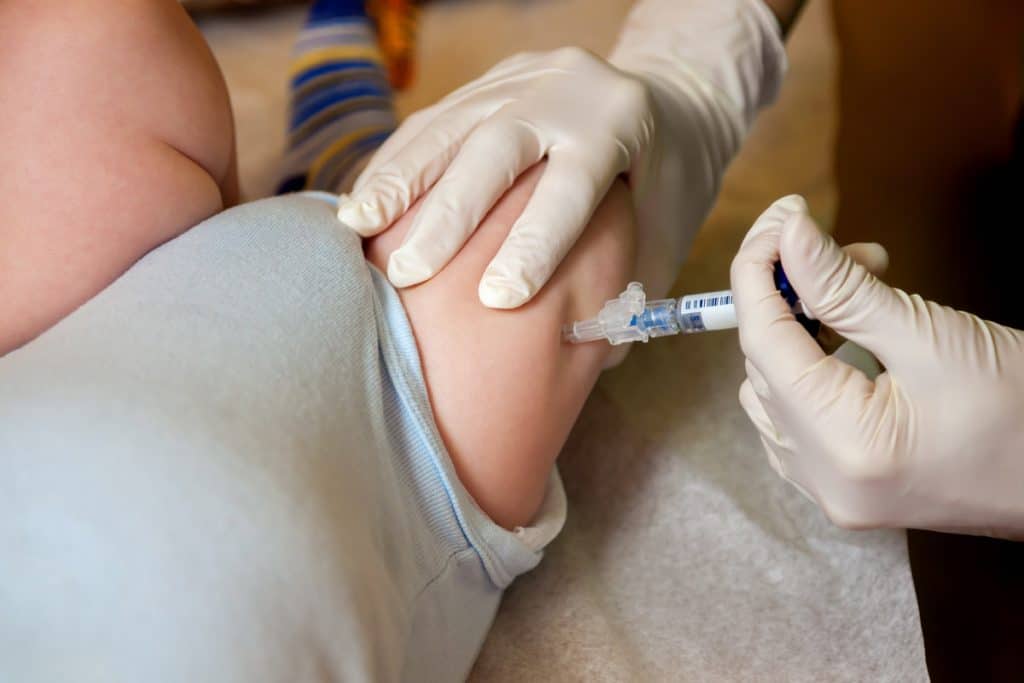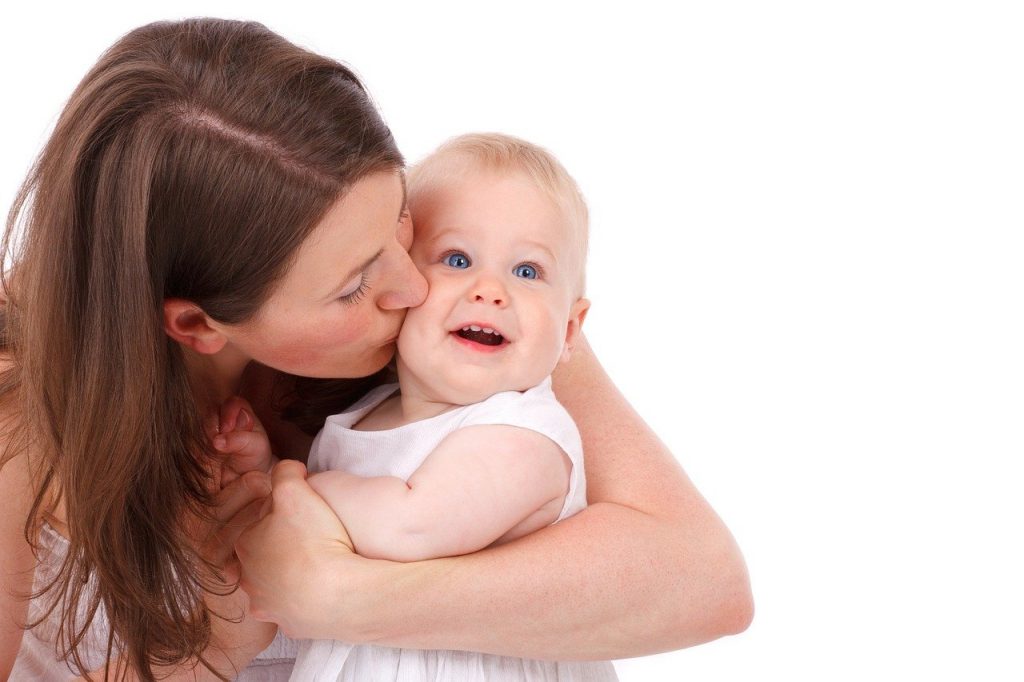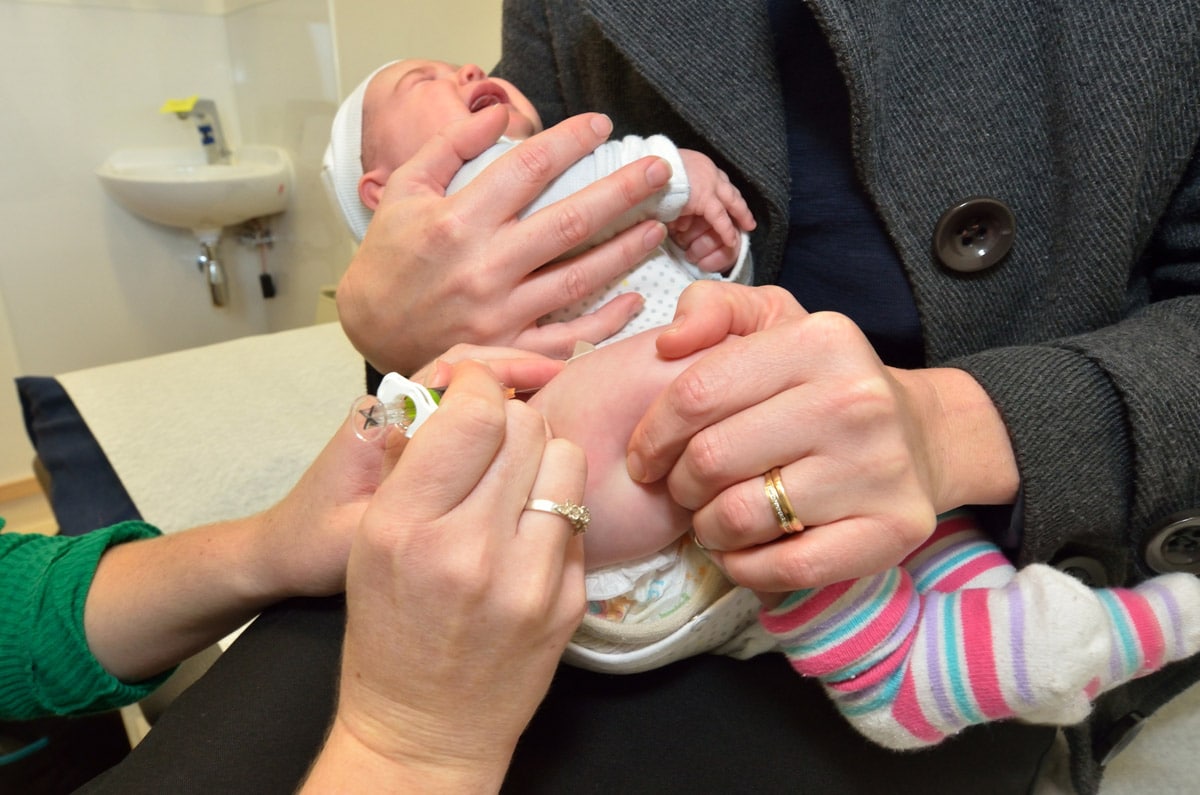Though there are many contentions out there, towering piles of scientific evidence suggest that vaccines are necessary for your baby’s long-term health. Yet, vaccine administration may be a difficult ordeal to overcome for many people. Watching your baby in discomfort due to the injection may cause worry. However, parents play a key role in alleviating vaccine-related discomfort to make the whole procedure more bearable for you and your baby.
In This Article
Importance Of Vaccination
Vaccination, also referred to as immunization, is a critical component of protecting an individual’s health. Vaccines may help prevent the spread of many severe illnesses. Although the body’s equipped with an immune system to help fend off diseases, some of them yet still manage to wreak havoc inside the human body.
Babies are said to be more prone to infections compared to adults due to their relatively weak and underdeveloped immune systems. That’s why it’s essential to safeguard them through vaccination. Immunizations are said to aid in the prevention of illness transmission and protect toddlers from potential fatalities. Failure to immunize children and other vulnerable groups of people may expose them to severe and sometimes deadly illnesses.
According to Ifpeds.com and other child care-focused sites on the web, immunization is one of the most beneficial steps you can take as a parent to promote your baby’s safety. Vaccines are said to train the immune system to recognize and fight life-threatening illnesses from the get-go. They operate by presenting the body with low concentrations of inactivated viruses and bacteria.
The inactivated viruses and bacteria are also referred to as antigens. These stimulate the immune system to produce antibodies that combat them. Such antibodies are ready to fight if the system is reintroduced to certain viruses or bacteria. As a result, the immune system develops resistance to the actual virus in the event that the body gets infected by it.
Since vaccines’ introduction many years back, medical professionals believe that they have significantly decreased the spread of serious infectious illnesses and saved countless lives.
When it comes to your baby’s first immunization visit to your preferred doctor, take the information mentioned above into consideration to help calm any concerns you may have regarding vaccines.
How To Prepare For Vaccination
Bringing your little one to the doctor’s clinic is always a stressful ordeal. It’s quite natural to feel more anxious than usual while preparing for a scheduled appointment that includes injections. However, there are certain measures you could do to get ready for the impending immunization that could make the process more pleasant.
Here are some ways to prepare yourself and your baby for the vaccination.
Know Your Infant’s Recommended Vaccinations Schedule
When you bring your infant to the doctor for the first time after their birth, you’ll get details on vaccines. They’ll create a record for your infant and provide you with a pamphlet outlining your vaccination schedule. Read the vaccination information provided by your child’s healthcare provider and take note of any concerns to relay to your pediatrician.
Vaccination schedules may vary significantly per location. But they’re often given at the following ages for your kid:
- between birth and two months;
- at four months;
- between 12 to 18 months; and
- four to six years old.
Every time your kid is vaccinated, ask the attending medical professional to update their immunization record. It’s critical to maintain this record up to date, even more so if you’ll relocate to another place with a different immunization schedule in the future.
Get A List Of Vaccines Your Youngling May Need
You may actually shield your baby against many vaccine-preventable illnesses by adhering to the prescribed immunization schedule. Below are some of the vaccinations recommended for babies as well as the illnesses they protect your child against:
Hepatitis B Vaccine
This vaccine protects against the hepatitis B virus, which causes liver problems. Your baby may have already gotten the first vaccination during their stay in the hospital after birth. The second dosage is given after one or two months. The third dosage is administered between six and eighteen months.
Rotavirus Vaccine
Vaccination for rotavirus safeguards infants against the most frequent cause of gastroenteritis and diarrhea. It’s advised between the ages of two and four months.
DTaP Vaccine
Diphtheria, tetanus, and pertussis (DTaP) is a combination vaccination that defends against three potentially fatal illnesses. Diphtheria swells the throat while tetanus causes painful muscle contractions. Pertussis, also known as whooping cough, makes it difficult for children to breathe.
It’s a five-dose vaccination process that is administered at two, four, six months for the first three doses. The last two doses are administered between 15 and 18 months, and between four to six years.
Hib Vaccine
The Hib vaccine defends against Hemophilus influenzae type b (Hib), a kind of virus that may cause diseases in the brain and spine. This virus may result in brain and hearing impairment in infants. Children require four doses: at two, four, six months, and between the ages of 12 and 15 months.
Pneumococcal Vaccine
The pneumococcal vaccination guards your baby against Streptococcus pneumoniae. It’s a bacteria that cause meningitis, pneumonia, and some types of ear infection. It’s likewise a four-dose sequence, with doses scheduled at two, four, six, and between 12 to 15 months.
Polio Vaccine
Polio is an illness that used to cripple over 25,000 individuals worldwide each year prior to the invention of the vaccine against it. Kids are now immunized against it at the ages of two, four, six to 18 months, and four to six years.
MMR Vaccine
MMR is also a combination vaccine that prevents measles, mumps, and rubella. Measles causes a rash and, in exceptional instances, may result in life-threatening brain enlargement. Mumps is a contagious disease that results in unpleasant, swollen salivary glands.
Additionally, rubella, commonly known as German measles, may result in severe birth abnormalities or miscarriages in pregnant women. MMR vaccination is advised between the ages of 12 and 15 months and four and six years.
Varicella Vaccine
Chickenpox was formerly seen as an irritating rite of passage for children. Additionally, it has the potential for severe consequences such as pneumonia. However, the varicella vaccination has significantly decreased its prevalence. It’s administered between the ages of 12 and 15 months and four and six years.
If your kid skips a dosage or falls behind schedule for any of these vaccines, ensure that they get the following dose promptly. Consult your kid’s healthcare practitioner to ensure that your young child is current on all necessary vaccinations.

Prepare Your Little One For The Vaccination
It’s generally advised that you dress your child loosely for the majority of shots will be administered in the thigh region for ease of vaccine administration. It’s also not recommended to give your infant paracetamol or any other pain medication prior to vaccination since this may mask the adverse effects of the vaccine that you need to spot early on.
Babies are often soothed with a feed after vaccines due to the pain of the injection itself, so be ready to perform breastfeeding or have a bottle of milk ready immediately following the shot. If necessary, seek the assistance of a family member to accompany you for support with any concerns such as carrying your infant as you sign and read through official papers and documents.
What To Do During Vaccination
There are a few things you can do during the appointment to ensure that your baby’s immunization visit goes as smoothly and hassle-free as possible. Here are few tips to follow on the day of the vaccination.
Communicate With Your Doctor
During your baby’s vaccination visit, your doctor will discuss your child’s medical history with you before administering any immunizations. They may ask about additional information including medications your child is currently taking, any health symptoms and allergies they may have, and others.
If your baby is unwell or experiencing a fever on the day of their vaccination session, notify the doctor straight away before any vaccination. They’ll determine if your young one should continue receiving vaccinations that day or whether it’s preferable to postpone and move the schedule to a later date until your little one is well.
Maintain Your Composure
When communicating to your child, try to have a calm attitude, be optimistic, and speak in your regular voice. If you’re nervous, babies are said to notice it immediately and become concerned as well. If you’re feeling uneasy, try taking a few gentle deep breaths to calm your nerves down.
Hold Your Baby Properly
During the shot, keep your infant on your lap. Hold the baby firmly with their body against yours while they’re being injected. Wrap your nearest arm over them and take hold of their outer arm.
Then, gently squeeze to provide a soft embrace to prevent them from breaking themselves free off your hold. Take care not to suffocate them since this would just add to their discomfort. After the shot, rhythmic rocking may also be done to pacify and relax your infant.

Divert Your Young One’s Attention
On the day of the actual vaccine shot, it’s regarded that bringing items with you that are soothing to your kid may help them focus on something positive. This may be a toy, pillow, or book to encourage them to divert their attention. Consult your physician before taking any objects inside the clinic with you.
Say your baby’s name, talk to them, sing a lullaby, or just act goofy before the jab to divert your kid’s focus away from the injection. Put a smile on your face and look at them so they’ll stare at you rather than at the needle. Continue the diversion even after the vaccination is administered.
Calm Them Down
If you’re nursing your child, breastfeed your baby during or immediately after the vaccine to gently calm them down. Breastfeeding may soothe your child by providing a reassuring personal touch from a loving mother.
After Vaccination Care
Vaccines, like any medication, may have minor and temporary side effects on a person’s health. The majority of infants get well easily after a vaccination. Following immunization, you’ll be requested to stay for a couple of minutes to ensure no adverse reactions occur as a result of the vaccine shot.
Here are a few tips to help your baby after the vaccination:
Give Your Child Extra Attention
Your kid may cry briefly after immunization but may feel a lot better following a warm hug. Also, they may feel agitated for a brief period and may be fussy in the following hours. Following a vaccination, some parents notice their infants require additional comforting at night.
Therefore, it may be worthwhile to free your calendar after your child’s vaccination to give them additional care and attention. Lavish them with affection and give more calming breastfeeds or embraces until your child feels better and reverts back to normal.
Minimize Your Baby’s Discomfort
Following immunizations, it’s normal for an infant to have a minimal reaction like redness at the area of vaccination, a higher body temperature, or crankiness. You may assist your baby in relieving their distress by applying a cold and damp cloth to the vaccination site or by preparing a lukewarm bath to bring down their body heat. Also, assure that your baby is properly hydrated every step of the way.
Occasionally, a child may feel exhausted, irritable, and unwilling to feed for several hours after a jab. After vaccination, plan to rest in a peaceful atmosphere at home. Make sure to make the necessary arrangements in your living space to promote a safe and cozy environment for your youngling to repose.
Watch Out For Possible Side Effects
Regardless of your baby’s age, it’s usual for them to have relatively common, moderate, and brief symptoms after vaccination. Mild discomfort, redness, and soreness at the body’s injection site are all common effects. These are often not serious and generally subside within a couple of days. Place a cold, damp towel on the region where the injection was administered to provide immediate relief.
Some infants may also have a slight fever after the vaccination. Giving your infant medication and pain relievers for fever management may help them feel better. Consult your doctor before providing any medicine to a baby under three months.
Adhere to the directions on the medicine’s packaging. The dosage is said to differ amongst different children. If you’re uncertain how much to administer to your infant, you may consult your pharmacist or physician.
Severe adverse reactions to vaccinations in infants are relatively uncommon yet quite possible to occur. However, if they cry uncontrollably for more than two hours and are experiencing a host of symptoms like have a very high temperature, convulsions, facial edema, or limpness, seek medical attention immediately.
Although uncommon, febrile convulsions may occur in young infants after the administration of certain vaccine types. A very high fever is the defining characteristic of this medical condition. While they’re startling to witness, they’re seldom dangerous. However, if the convulsions last more than three minutes, call emergency hotlines promptly.
Fever and rash may occur after MMR or Varicella vaccinations. This indicates that your child is experiencing an immune response to the vaccination while their body develops antibodies to the virus. During this crucial time, provide care and undivided attention to your baby as much as possible.
Your Baby Depends On You
Bear in mind that babies pick up on their parents’ emotional cues. Even the tiniest infants may pick up on your stress and worry. Due to their inept and strong receptivity of their surroundings, in the event that you panic and feel uneasy during vaccine sessions with your family doctor, your baby is likely to feel the same. Practice calmness and take several deep breathes. Luckily, vaccination is brief and swift but its health benefits will last a lifetime.









![Home Renovation Guide [2025]](/app/uploads/2021/04/design-hacks-1-378x300.jpg)
